hankyoreh
Links to other country sites 다른 나라 사이트 링크
[Guest essay] China has already successfully united Hong Kong
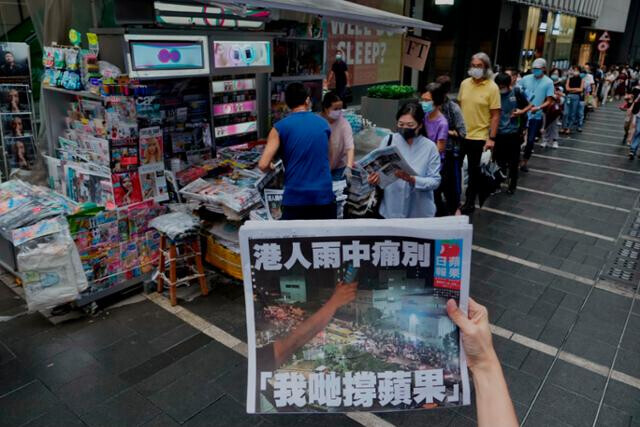
On June 24 of last year, the Apple Daily, the most popular democratic media outlet in Hong Kong, published its last paper and, on the same day, the whole of Next Media Group, the tabloid’s parent company, suspended its operations.
About a month later, Jimmy Lai, 74, the founder of Next Media Group (now known as Next Digital) was arrested along with six managers and editors of the Apple Daily on charges of “endangering national security by conspiring with foreign powers” under Hong Kong’s National Security Law.
Despite the principle of innocence until proven guilty, a Hong Kong court rejected an application for bail, arguing it could endanger national security. Lai and the staff remain in prison to this day.
Here, I will look back at the recent changes in Hong Kong, changes over the past 16 months, and changes in my own life.
When the Apple Daily shuttered in June 2021, I lost my job as a reporter at the tabloid. At the time, I shared my intention to continue reporting to my colleagues in media and the world. Although I tried to think of ways to continue my career as a journalist, for various reasons, I couldn’t work for other media outlets in Hong Kong.
After that, I worked as a freelance journalist writing articles on specific topics, analyzing breaking news, and covering court trials and creating special pages on social media to publish my articles.
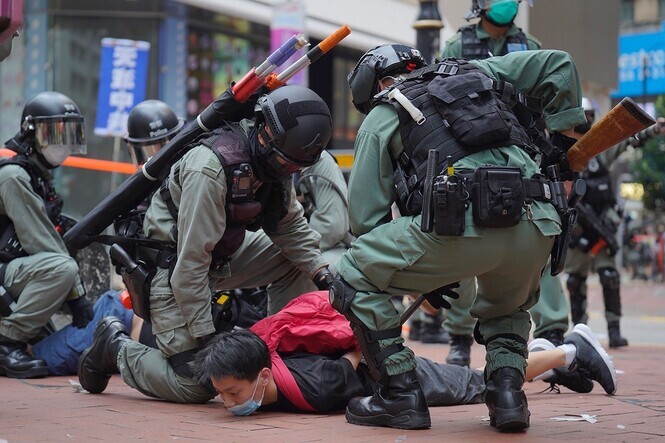
I also briefly worked with Hong Kong's other pro-democracy media outlet, Stand News, but they too were soon dissolved. With the drastic changes taking place in Hong Kong society, I believe that there are still issues that need attention. While always keeping the potential dangers in mind, I will continue to do my best as a journalist.
Although many think that being a reporter in Hong Kong nowadays is very difficult, many excellent colleagues still continue to report on the situation in Hong Kong by creating various one-person media outlets.
My colleagues and I plan to shortly open a new online platform (www.hkcourtnews.com) to focus and report on the trial situation in Hong Kong. Our hope is that we will be able to continue providing Hong Kongers with news and information through it.
Recently, Hong Kong has been abuzz over the trial of Jimmy Lai, who was arrested a year and a half ago.
As of Dec. 1, Lai was awaiting his formal trial. Six Apple Daily managers and editorial officials arrested with him are already awaiting rulings after pleading guilty at their trial on Nov. 22.
Ahead of his trial, Lai asked the court to allow the appointment of a British lawyer, which the court approved. But the Hong Kong Department of Justice objected.
In Hong Kong, it is possible for overseas attorneys to be hired to take part in legal cases — the Hong Kong government itself has done so on several occasions. But the government was adamant.
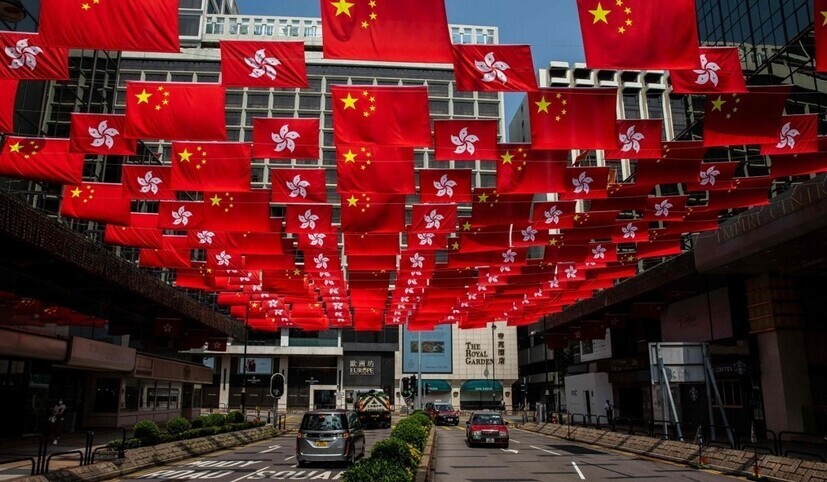
On Nov. 28, Hong Kong’s top leader, Chief Executive John Lee Ka-chiu, said he had asked the Standing Committee of the National People’s Congress — China’s equivalent to a parliament — for an interpretation on whether foreign counsel could take part in national security-related cases, claiming there had been many cases of foreign interference in Hong Kong’s internal affairs. Hong Kong prosecutors asked to defer the trial until there had been a determination from Chinese authorities, and the court postponed the trial until September of next year.
This means Lai will have to remain in prison until next year, and that “decisions” by China will once again influence the judgments of Hong Kong courts. In the past, China has issued five interpretations of Hong Kong’s Basic Law, through which it has exerted influence over the rule of law and judicial independence here.
Hong Kong has undergone many changes in the last year and a half. In particular, the closure of Apple Daily in June 2021 has led to people adopting new attitudes toward the Hong Kong National Security Law introduced in June 2020.
In its wake, numerous organizations in Hong Kong civil society have chosen to disband. Examples of this include the Hong Kong Professional Teachers' Union, which had been Hong Kong’s largest teachers’ union; the Civil Human Rights Front, which had been a focal point of civil society; and the Hong Kong Alliance in Support of Patriotic Democratic Movements of China, which had supported campaigns for democracy and freedom in China since its establishment in 1989.
In the case of the Hong Kong Alliance, key officials remain in prison after being charged with “incitement of the subversion of state authority.”
Besides Apple Daily, other media classified as “pro-democracy” and “progressive” include the websites Stand News and Citizen News, where a former chief editor and acting chief editor were arrested late last year on charges including the dissemination of inflammatory material.
Stand News was immediately shut down and had its cash assets frozen. Its officials are currently on trial, with two defendants who have been detained for nearly a year. Citizen News stopped operating immediately after the Stand News shutdown; fortunately, none of its staff have yet been arrested.
The charges of “incitement,” which have appeared several times here, are a legacy of Hong Kong’s colonial era. They had previously been more or less a dead letter after the enactment of a human rights law in the 1990s. Indictments on “incitement” charges were regarded as violating human rights.
But since the national security law was introduced by China in July 2020, the Hong Kong government has issued at least 20 indictments on incitement charges. The cases all have certain aspects in common: the defendants are held without bail, and the trial process is not properly disclosed, as officials cite the “need to restrict press freedoms.”
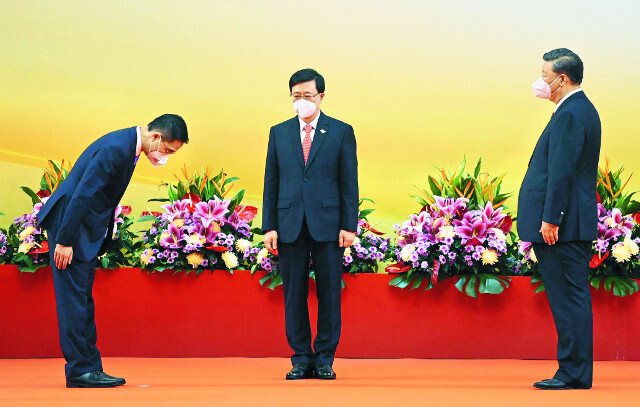
Based on principles of patriotism and putting national security ahead of all else, Hong Kong’s government describes it as having entered a “beautiful new era.” The government stresses that Hong Kong is proceeding from “chaos to order and from order to prosperity.”
But the “colorful Hong Kong” of the past has disappeared.
Before, some Hong Kongers would raise the flag of the Republic of China to celebrate Taiwan’s National Day on Oct. 10. Since last year, those flags have been absent, as the act of raising them has been deemed illegal. Instead, all of Hong Kong becomes a sea of red with the People’s Republic flag on Oct. 1, which is China’s National Day.
Also absent for the last two years are the 8964 candlelight vigils, which had been held for over 30 years in Hong Kong to remember the Tiananmen Square protests.
Previously, Hong Kongers had gathered in Victoria Park to light candles as symbols of conscience. Since June 4 of last year, such displays are nowhere to be found. Some people have expressed commemorative messages online, but it remains to be seen whether this will continue to be allowed under Hong Kong’s national security law.
The past year has also seen changes in personnel as terms have ended for key officials, including Hong Kong’s chief executive and members of its Legislative Council (the equivalent of parliament).
Former Chief Executive Carrie Lam pursued the amendment of Hong Kong’s extradition law in a bid for reelection but failed to keep her seat. John Lee, who as secretary for security had been responsible for cracking down on the large-scale civil movement, was hand-picked as a successor by Beijing and became the new chief executive last May.
China has also ignored the Basic Law when it comes to the Legislative Council, switching out its systems while rejecting all dissenting opinions. All of those elected to the council in December of last year were from the pro-Beijing camp.
Despite the arrival of a new chief executive and Legislative Council, there are no signs of any resolution to the housing and COVID-19 woes that Hong Kongers have been struggling with.
Under the previous administration, Lee had been one of the officials leading the way in responding to the pandemic. But his actions only precipitated a fifth wave of infections, with Hong Kong recording a higher mortality rate than the global average at the time. There is a lot of discontentment among Hong Kongers, but any forum for expressing it has long since disappeared.
Recently, China experienced large-scale “blank paper protests” that gave voice to disgruntlement over the country’s protracted and intensive lockdowns. According to the foreign press, Chinese President Xi Jinping said in a meeting with European Council President Charles Michel that young people in China were “disheartened” over the zero-COVID policies.
Hong Kongers also took to the streets to support the blank paper protests in China. But Chris Tang Ping-keung, Hong Kong’s current secretary for security, was even faster than Xi to proclaim these demonstrations to be an “act targeting the center,” insisting that the participants were attempting to “subvert state administration.”
Hong Kong has already been successfully “united” with the Chinese mainland.
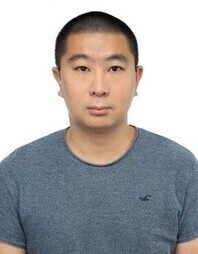
By Chen Jiaming, former Apple Daily reporter
Please direct questions or comments to [english@hani.co.kr]

Editorial・opinion
![[Column] Life on our Trisolaris [Column] Life on our Trisolaris](https://flexible.img.hani.co.kr/flexible/normal/500/300/imgdb/original/2024/0505/4817148682278544.jpg) [Column] Life on our Trisolaris
[Column] Life on our Trisolaris![[Editorial] Penalties for airing allegations against Korea’s first lady endanger free press [Editorial] Penalties for airing allegations against Korea’s first lady endanger free press](https://flexible.img.hani.co.kr/flexible/normal/500/300/imgdb/original/2024/0502/1817146398095106.jpg) [Editorial] Penalties for airing allegations against Korea’s first lady endanger free press
[Editorial] Penalties for airing allegations against Korea’s first lady endanger free press- [Editorial] Yoon must halt procurement of SM-3 interceptor missiles
- [Guest essay] Maybe Korea’s rapid population decline is an opportunity, not a crisis
- [Column] Can Yoon steer diplomacy with Russia, China back on track?
- [Column] Season 2 of special prosecutor probe may be coming to Korea soon
- [Column] Park Geun-hye déjà vu in Yoon Suk-yeol
- [Editorial] New weight of N. Korea’s nuclear threats makes dialogue all the more urgent
- [Guest essay] The real reason Korea’s new right wants to dub Rhee a founding father
- [Column] ‘Choson’: Is it time we start referring to N. Korea in its own terms?
Most viewed articles
- 1New sex-ed guidelines forbid teaching about homosexuality
- 260% of young Koreans see no need to have kids after marriage
- 3[Column] Life on our Trisolaris
- 4OECD upgrades Korea’s growth forecast from 2.2% to 2.6%
- 5Presidential office warns of veto in response to opposition passing special counsel probe act
- 6Months and months of overdue wages are pushing migrant workers in Korea into debt
- 7[Guest essay] Maybe Korea’s rapid population decline is an opportunity, not a crisis
- 8[Editorial] Penalties for airing allegations against Korea’s first lady endanger free press
- 9[Reportage] On US campuses, student risk arrest as they call for divestment from Israel
- 10Korea sees more deaths than births for 52nd consecutive month in February